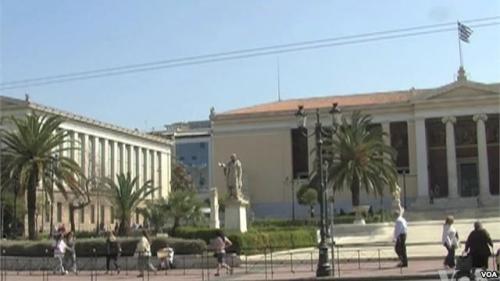Eurozone Braces for Greek Election
Eurozone countries will be anxiously watching the outcome of second-round of legislative elections Sunday in Greece, which may determine the country's future role in the eurozone.

Scene in Greece
Greek voters will be choosing between parties that call for two different ways of dealing with the country's creditors: either largely adhering to the austerity commitments Athens made in return for bailout funds, or to abandon them and negotiate for better terms.
If Greek voters choose the more radical Syriza party, which rejects the austerity measures, experts believe Greece will leave the 17-nation eurozone. However, other economists, such as Simon Tilford of the London Center for European Reform, say Greece is heading for the exit regardless of the election's outcome.
"I struggle to see how Greece can stay within the eurozone. I think for that to happen, the country would need ongoing support," said Tilford. "I don't just mean loans, but ongoing transfers of money from elsewhere within the eurozone."
The Greek legislative vote caps a grim week for the currency union, during which Spain and Italy saw their borrowing costs soar, underscoring investor concerns about their economies. Following talks in Rome on Thursday, French and German leaders said they hope Greece will keep the euro as its currency.
French President Francois Hollande emphasized this in an interview on Greek television.
Hollande says that if Greeks give the impression they will not meet their bailout engagements, then some eurozone countries will want Athens to leave the currency union. He called for Greece to remain in the eurozone, but also for a relationship built on trust.
Economist Tilford says European governments have low expectations.
"Although they know that no Greek government is really going to be able to abide by the terms of the bailout, because the bailout places unrealistic demands on Greece, they hope that by at least having a committed government there, they will be able to buy some time and that the pressure on Spain and Italy will dissipate," said Tilford.
Divisions are also sharpening about how to tackle the eurozone crisis, with France and Italy calling for more growth measures and Germany sticking by its austerity prescriptions. These competing visions will be on the table in Brussels, during a European Union summit later this month.
Source: Voice of America
- 408 reads
Human Rights
Ringing FOWPAL’s Peace Bell for the World:Nobel Peace Prize Laureates’ Visions and Actions

Protecting the World’s Cultural Diversity for a Sustainable Future

The Peace Bell Resonates at the 27th Eurasian Economic Summit

Declaration of World Day of the Power of Hope Endorsed by People in 158 Nations

Puppet Show I International Friendship Day 2020

